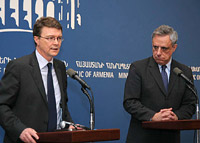“It is unacceptable for a CoE member state to have political prisoners,” reiterated the head of the Ago monitoring group Per Sjogren during yesterday’s press-conference with Armenia’s Foreign Minister Vardan Oskanyan. The Group, which is headed by the latter, is named as AGO Group. Sjogren mentioned in Yerevan that the AGO Group hasn’t ever visited Yerevan with such a big delegation, which included nine members of the Council of Europe. He pointed out that the Ago delegation is more extended than ever in Armenia, because of the situation following the March 1 events. “The Council of Europe considers Armenia a partner and an important country in the region, that’s why we are concerned over the recent events in Armenia. We underscore the importance of political means to get back to a democracy path”, he said. Aiming at the stabilization of the current situation, Mr. Sjogren presents the Armenian government six propositions elaborated by the CoE. The crucial suggestions refer to those who were detained or arrested on political grounds. Mr. Sjogren has personally visited the “Kentron” penitentiary institution and met with the people detained during the post-election period in the result of the March 1 events and who are deprived from the right to meet their relatives. The Ministry of Justice assured Mr. Sjogren that the situation will soon be rectified and will enable the prisoners to communicate with their relatives. Second, “The European Union supports the international organizations which have called for releasing the individuals detained with political considerations.” While answering the questions, the speaker did not make it clear how to distinguish the individuals detained with political considerations from those inciting disorders and provocations, and if the organizers of the “peaceful rallies” have made statements and committed actions resulting in murders, ravage and vandalism, whether this constitutes a “political activity” or a grave criminal offence. The second demand (or proposal) advanced to the RA authorities, particularly the Minister of Justice, is that the authorities shall periodically and at regular intervals notify the Council of Ministers of both the process of releasing the detainees and the judicial procedures. The fourth enshrined in the document is quite “fuzzy”. It proposes the RA authorities to conduct an impartial and “independent investigation” and clarify all the circumstances of the March 1 disorders. Ago group also suggests a transparent “national investigation” of the March 1 events. “We do not interfere in the details of such an investigation. But it must not include solely bodies of state government, say, the Office of the Prosecutor General. It must involve all national forces and institutions which enjoy a widespread trust of the people of Armenia”, Sjorgen noted. By the way, during the events of March 1 7 out 8 victims were civilians, who died because of gun shots and so far no policemen was arrested. In these conditions how can the society trust the state investigation? Don’t you think that it will be necessary to conduct an independent investigation on the events of March 1? To these questions of the A1+ Sjorgen responded, “Such investigation must be conducted by the state. This will be a report on part of the state. And I said that this report must be made in a way to enjoy the confidence of the society. International independent experts may also be included in the investigation process.” The fifth point of the proposals concerns the changes regulating the rights and liberties envisaged by the law on “Marches, Demonstrations and Rallies”. “We regret that the law was adopted in conditions of the regime of the state of emergency, without consultations and discussions with the European Union. The Venice Committee has conducted an urgent expertise of the newly adopted law and has criticizing assessments which have already been submitted to the Ministry of Justice and the Government. We anticipate the Government to raise those questions in the Parliament,” Mr. Syorgen said. And finally, by proposing the 6th point, the Ago group calls on the “parties” to initiate, without preconditions, a round table discussion over the issues of concern. This is proposed as a key to decreasing the tension and as a settlement of the “conflict” between the authorities and the opposition. The reporters noted that earlier the CoE had advised the opposition to accept the decision of the Constitutional Court which recognized the outcome of the presidential vote. They asked Mr. Sjogren why there is no mention about it in their propositions. Has the approach of the CoE regarding the Constitutional Court changed, or is the absence misunderstanding? Per Sjogren says that dialogue is important in this connection. The head of the Ago Group said their propositions should be viewed as tended to future.

